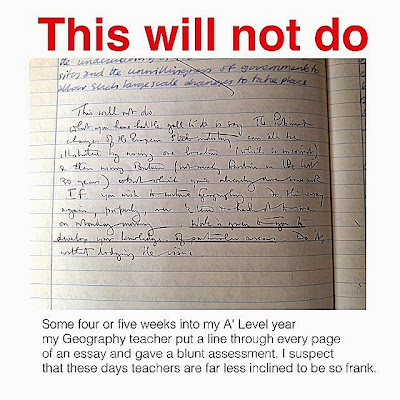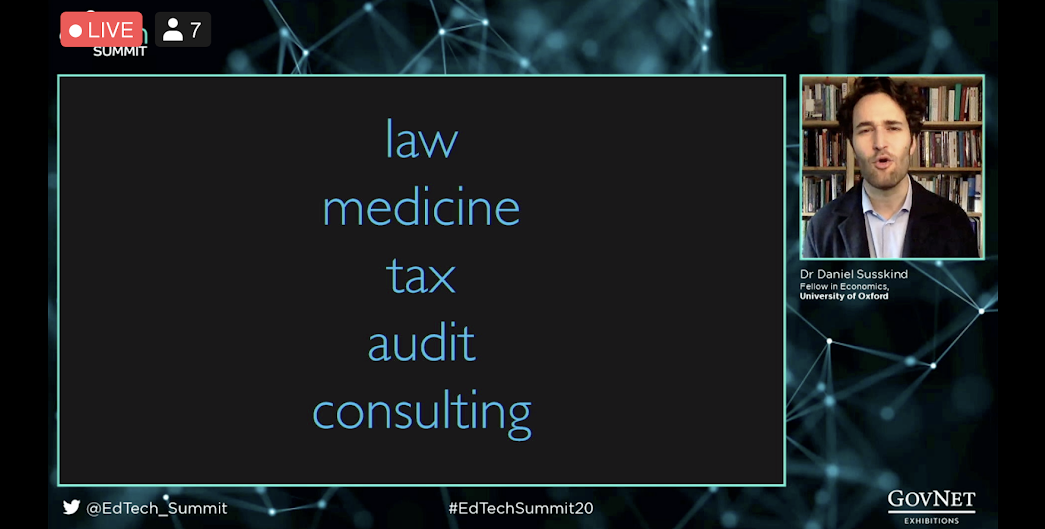
Fig. 1 My A' level Geography exercise book
Somehow a handful of exercise books and files from my A'level years have survived three+ decades. On very rare occasions on stumbling across these in a box, in a garage or shed, or attic I've glanced at a few carefully drawn diagrams or maps, smiled proudly at the grades achieved in the final pages, but never stopped to take a careful look at the truth.
The truth when I read it made me faint. Was I that bad? Was the teacher so blunt? How come I didn't go ape-shit and promptly quit the course?
If I wish to I could seek enlightenment in the diary I kept at the time; I have little doubt that on a teen quest for 'love' there were other priorities in my life.
Reading this I fear my brain has buried my feelings; it's as if I am reading it for the first time. Every page, 'only twelve', are lightly scored through. In all credit to a brilliant teacher - I believe, ultimately that all but one or two in the class got an A grade 18 or so months later, he offers a bullet-pointed suggestion of an essay plan. The 'half-term' reply to this gets a C-- and a middling response that clearly indicates that only an 'A' will do. All of this experience is new to me in my schooling to date. Threats usually failed, seven years previously having done badly in a French Test I was threatened with a caning if I didn't get x% minimum in a retake ... after half-term. My arse was saved; I suspect my response could have been as violent as the teacher's had he come near me ...
When it comes to the 'carrot and stick', my experience is that I need both applied and given firmly.
Four essays and as many weeks later this teacher's response is somewhat different:

Fig. 2. Same Geography exercise book, four to five weeks later.
It is odd, though invaluable to be reflecting on this some 35 years after the event. It relates to learning; I'm not teacher-trained. It relates to e-learning too, at all the levels where it is offered. How does or can the technology be used so that a teacher or tutor can provide blunt, constructive feedback in a way that achieves its aims for the individual student? How did this teacher get extraordinary results out of a class, many of whom I knew well and would have rated themselves at the D/E level of likely attainment?
Fundamentally, I feel, is that he, and most others I had during these years were a) vocational educators b) brilliant at their subject c) practitioners.
This teacher was cold, but hugely enthusiastic and knew the subject down to the tiniest detail. He knew his art and gave classroom presentations that came from his soul, not from an Edexcel textbook on his desk. A year later he frankly said that he would teach us what we'd get in our first year at university to maintain our interest ... to keep us simmering as exams approached. And as the 'Physical Geographer' he would often start a lesson with photographs of a climbing trip in Scotland or flying a glider over Northumberland.

Fig.3. What kind if daisy is your essay?
At the end of this particular exercise book the teachers fills half a side of A4, in red biro, doing his best, now for the umpteenth time, to get me to understand what an essay at this level requires; it is here that he draws takes up drawing a flower, a daisy, suggesting that the perfect essay has five or six petals and a simple step, not the twelve petals, or lopsided, or trunk of an essay that I could produce.
The purpose of the essay, especially assignments that are not graded, are multiple but never, from I can see, used in the e-learning produce by the Open University. Where is the chance to find your feet, to have a go and fail, to learn through trial and error how to get it write? What role, in any case, would a tutor play to improve an essay style, or to simply help a student get their approach right? And what is the value in assessing a student in a modular form when they cannot expect to be anywhere near to mastering their subject until they've been studying for a year?
How can this vital, human component, make its mark in e-learning?
Artificial Intelligence must surely offer a smart answer; how else can the many millions who are denied an education at this level have a chance at the experience?
Tellingly, I see that there are comments made in these text books that I struggle with still. I write too much, but in the essay where the purpose is to gather in and focus multiple ideas from several sources in order, at a later date, to refine and prioritise what YOU personally think matters, then more is far, far preferable and necessary then the essay with the limited word count. What happens otherwise is that too early in the learning process the student is expected to reduce down a substance, their research and thoughts, which in the early stages are bound to be on the thin side. From this 'thin; input a thinner essay is meant to be the basis on which the student takes their learning forward.
There has to be a better way.
Or alternatives.


